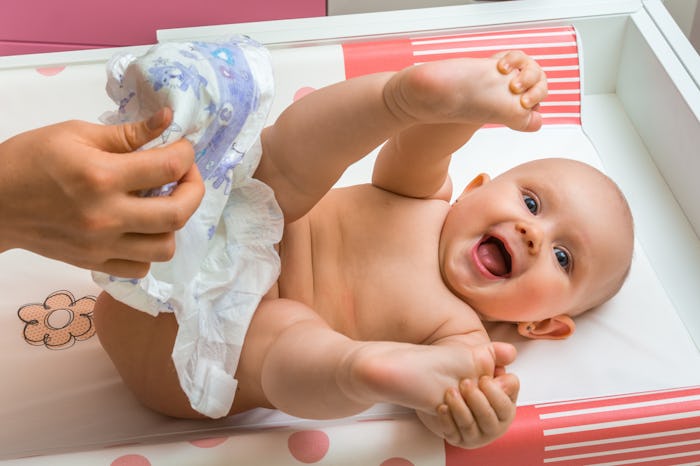Life
Your Baby's Poop Reveals Even More About Their Health Than Previously Thought, Study Finds
A big part of being a new parent is, unfortunately, poop. You change your baby's diaper a million times a day. You scrape their poop into the toilet. You wipe poop off their butt (and their back and their front and sometimes even THEIR FACE? OH MY GOD HOW DID THIS HAPPEN?) Doctors have long advised parents to keep track of baby poop, monitoring things like frequency, consistency, and color. And because baby poop has been studied so much over the past century, scientists were able to make a pretty important observation about the way baby poop has changed over time. In fact, according to a new study, pH levels in baby poop are very revealing.
The study, published in the journal mSphere, studied baby poop's pH levels from 1926 up until the present day. The researchers reviewed 14 clinical studies between then and 2017 that looked at 312 "healthy breastfed infants." Over time, they found, pH levels in baby poop have steadily increased since 1926, picking up even more steam in the years since 1980. In general, pH in baby poop changed from 5.0 to 6.5 since 1926, and researchers believe this increase may cause a microbial imbalance, something that can lead to health problems like "certain types of cancer; autoimmune diseases like thyroid disorders, multiple sclerosis and type 1 diabetes," according to CBS News.
But let's back up a bit and explain what that all means. Firstly, as TODAY explained, pH measures how acidic or alkaline something is, and these levels can reveal information about a baby's microbiome. That's noteworthy because their microbiome plays a very important role in the processes of digestion and nutrition according to research published on the National Center for Biotechnology Information. Furthermore, the microbes found in microbiomes "contribute metabolic functions, protect against pathogens, educate the immune system, and, through these basic functions, affect directly or indirectly most of our physiologic functions." As TODAY put it, microbiome help "protect us from disease," so its overall health is important.
So, what exactly do these increasing pH levels in baby poop mean? The study noted that a lot of evidence exists proving that "the infant gut microbiome has important long-term health implications." For example, a 2013 study published in the Canadian Medical Association Journal found that baby poop could help us understand conditions like asthma, obesity, and diabetes, as CNN reported at the time. For this most recent study, the researchers concluded:
The loss of Bifidobacterium and the profound change in the gut environment, as measured by fecal pH, present a compelling explanation for the increased incidence of allergic and autoimmune diseases observed in resource-rich nations.
Basically, allergies and autoimmune diseases have been on the rise over the past century, and the researchers believe this change in pH could have something to do with that. That being said, what has caused this change? The study detailed three possible reasons: an increase in formula feeding, C-section deliveries, and the use of antibiotics.
The study noted that breast milk has a "bacterial selectivity" that formula does not, explaining:
A rapid increase in the use of human milk replacers (e.g., evaporated milk and infant formula), which lack the bacterial selectivity of human milk, beginning in the 1920s may have resulted in the inability to foster high levels of specialized infant-associated Bifidobacterium in the infant gut among nonbreastfed infants.
Since the 1980s, more babies have been delivered via C-section, which researchers believe can affect bacteria as well. "Increased caesarean section delivery since the 1980s further limits the natural fecal-oral transfer of Bifidobacterium from mother to infant associated with vaginal delivery," the study explained.
And lastly, the researchers noted that it's become common practice to take antibiotics during childbirth, which can affect an infant's gut bacteria. The researchers wrote, "Antibiotic use has become increasingly common during labor and many infant-associated species of bifidobacteria are sensitive to antibiotics."
All that being said, the researchers behind the study do not seem to advise expectant or new mothers to avoid formula feeding, C-sections, and taking antibiotics during labor. Those three things are incredible and important medical advancements. Many parents are perfectly happy with their choice to employ them, and many parents have no choice but to employ them.
Until there is more research on how exactly things like formula feeding, C-sections, and taking antibiotics during labor affect a baby's gut and therefore their overall health, there's nothing to worry about. Of course, if you have any concerns about your little one's poop, always check with your doctor. But this study just provides a further look into how telling your baby's dirty diapers really are.
Check out Romper's new video series, Bearing The Motherload, where disagreeing parents from different sides of an issue sit down with a mediator and talk about how to support (and not judge) each other’s parenting perspectives. New episodes air Mondays on Facebook.
